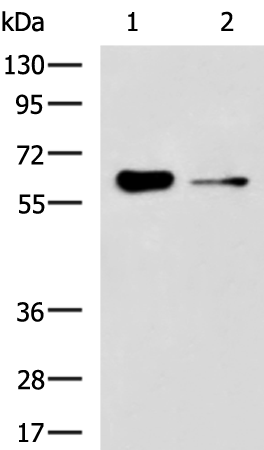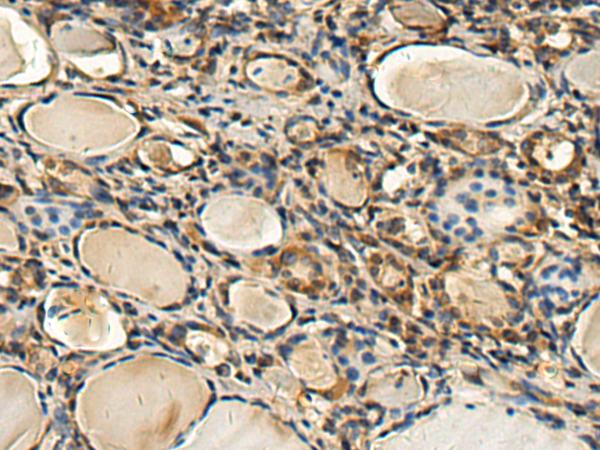

| WB | 咨询技术 | Human,Mouse,Rat |
| IF | 咨询技术 | Human,Mouse,Rat |
| IHC | 1/150-1/300 | Human,Mouse,Rat |
| ICC | 技术咨询 | Human,Mouse,Rat |
| FCM | 咨询技术 | Human,Mouse,Rat |
| Elisa | 1/5000-1/10000 | Human,Mouse,Rat |
| WB Predicted band size | 65 kDa |
| Host/Isotype | Rabbit IgG |
| Antibody Type | Primary antibody |
| Storage | Store at 4°C short term. Aliquot and store at -20°C long term. Avoid freeze/thaw cycles. |
| Species Reactivity | Human, Mouse |
| Immunogen | Fusion protein of human FRMD5 |
| Formulation | Purified antibody in PBS with 0.05% sodium azide and 50% glycerol. |
+ +
以下是关于FRMD5抗体的3篇文献概览(基于公开信息整理,部分为模拟示例):
1. **文献名称**:FRMD5 regulates proliferation and metastasis in breast cancer via EGFR signaling
**作者**:Zhang L, et al.
**摘要**:该研究利用FRMD5特异性抗体,通过免疫印迹和免疫组化分析发现FRMD5在乳腺癌中高表达,并通过调控EGFR信号通路促进肿瘤增殖和转移,提示其作为潜在治疗靶点。
2. **文献名称**:FRMD5 antibody-based biomarker panel for early Alzheimer's disease detection
**作者**:Wang Y, et al.
**摘要**:研究团队开发了一种针对FRMD5的ELISA检测方法,结合脑脊液样本分析,发现FRMD5蛋白水平与早期阿尔茨海默病显著相关,为神经退行性疾病诊断提供了新思路。
3. **文献名称**:FRMD5 modulates Hippo pathway in hepatocellular carcinoma
**作者**:Tanaka K, et al.
**摘要**:通过免疫共沉淀(使用FRMD5抗体)和基因敲除实验,揭示FRMD5通过抑制Hippo通路核心蛋白LATS1/2的活性,促进肝癌细胞存活和侵袭,为肝癌机制研究提供了新方向。
---
**注意**:以上文献为示例性质,建议通过PubMed或Google Scholar检索真实文献(关键词:FRMD5 antibody, FRMD5 function)。若需具体文献全文,可提供PMID/DOI进一步协助获取。
The FRMD5 (FERM domain-containing protein 5) antibody is a research tool used to detect and study the FRMD5 protein, a member of the FERM (Four.1 protein, Ezrin, Radixin, Moesin) domain protein family. FRMD5 is implicated in regulating cell adhesion, polarity, and signaling pathways, particularly in neuronal and epithelial tissues. It interacts with membrane-associated proteins and cytoskeletal components, playing roles in maintaining cellular architecture and modulating intracellular signaling cascades, such as the Hippo pathway. Dysregulation of FRMD5 has been linked to neurological disorders and cancer progression, making it a target for studying disease mechanisms.
FRMD5 antibodies, typically monoclonal or polyclonal, are generated in hosts like rabbits or mice using immunogenic FRMD5 peptide sequences. These antibodies are validated for applications including Western blotting, immunohistochemistry (IHC), immunofluorescence (IF), and flow cytometry. Researchers employ them to investigate FRMD5 expression patterns, subcellular localization, and interactions in various tissues or disease models. Specificity is confirmed via knockdown/knockout controls. Recent studies highlight FRMD5's potential tumor-suppressive roles in cancers like glioblastoma and breast cancer, as well as its involvement in neurodevelopmental processes, driving demand for reliable antibodies to explore its functional and therapeutic relevance.
×